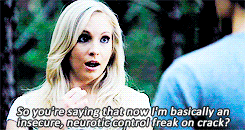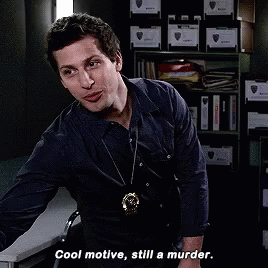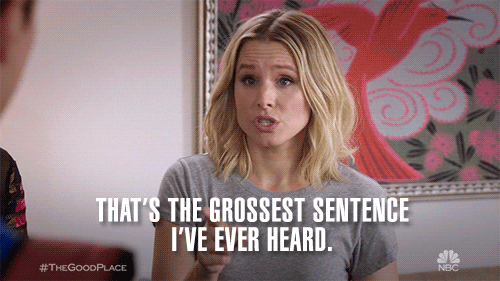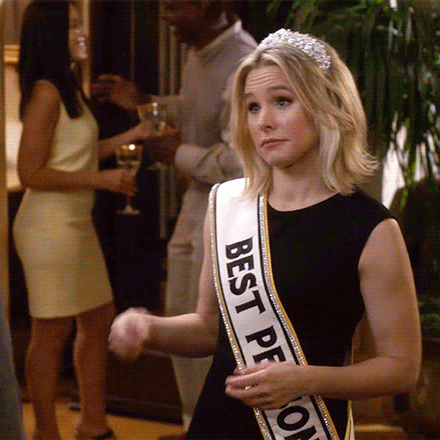There has been a shift in storytelling. It is minor enough that it took me a couple of years to notice it, but now that I have I can’t stop thinking about it.
I used to be one of those people who loudly declared that “supporting characters are more interesting than protagonists”. In a lot of my favorite stories, my favorite character isn’t the main one. Hermione is more interesting than Harry to me, I like Blair better than Serena.
Lately, I have noticed a change. Now, Adora is my favorite character in She-Ra, Eleanor in The Good Place. Even when that’s not the case, I find Jake Peralta just as interesting as my Brooklyn Nine-Nine favorite, Captain Holt—I’m invested in Jake, I want to see him do well and be happy.
Many a screenwriting book will tell you that in order for your narrative to work, the audience needs to like your protagonist. They must root for them, find them redeemable. There is a whole book named after that reason! Though Save the Cat! By Blake Snyder isn’t just about making the character engaging. Factor in that storytelling as a profession is part of a business. For a business to thrive, it must please its target, and the wider the target, the more it does. Read: We must make the character as appealing as possible for as many people as possible. That’s a tough call. The widest definition of “likeable” is nice. Good, even. But that on its own can be boring.
In an effort to make the character likeable, sometimes writers go a bit too far… or rather, they hold back. That is how we have ended up with characters who are… boring, sometimes. Or at least who aren’t as interesting as those around them. Go a bit too far and you can end up with Mary Sues. Worst case scenario, the writer will bend the narrative around them to frame their actions and viewpoint as right, which… well, brings a host of other problems. I call this the Curse of the Protagonist
Lately though, all signs point to the curse being broken. Stories are getting more interesting protagonist. Clearly, someone figured something out, and everybody else is catching on. In this article, I set out to figure out what that was.
The Curse Is Laid Down
Here’s how it stands: the protagonist is the focus of the story. They carry the narrative and are often the point of view. Since they are the center, whether the story does something for us or not depends on whether we root for them. Often, they get the most neutral characteristics, the most widely relatable ideals. They usually don’t get to have exaggerated quirks, unforgivable pasts, irredeemable qualities.
The characters around him, be them supporting characters or antagonists, are the ones who get all that. They get to be darker, or quirkier, even outright weird. They are often more unique.
It’s why you find entire essays dedicated to why the Harry Potter series would have been better read from Hermione’s or Neville’s perspective instead of Harry. (Not that I wouldn’t read that). Sam gets to be crazy and over-the-top while Carly is more “vanilla” in iCarly. In The Vampire Diaries (TVD), Caroline Forbes gets to be selfish and vain and grow into her goodness, while Elena Gilbert’s is assumed from the start.

Elena had plenty of fans on TVD, most of them centered not on her, but how she factors in the happiness of the Salvatore Brothers. Both of them murderers, both of them with irredeemable characteristics, especially Damon. I hated Damon. He was woobified by the narrative to a degree I found sickening: other characters constantly made excuses for him and because at the bottom he had “a heart of gold”, he rarely saw real, permanent consequences. I’m just saying, there is a reason he was, and is, overwhelmingly the most popular character of that show. Don’t even get me started on Gossip Girl’s Chuck Bass.
Here’s where we find that line between depiction and endorsement we go on about so much here. Even though those two cases were badly handled, there is something to be learned from their overwhelming popularity. They weren’t just fan-favorites as the series was running. They’re beloved, and their fandoms endure. Part of the answer to my fundamental question lies somewhere in there, I think.
Make Me Like Them
Before George RR Martin published the first book in his A Song of Ice and Fire series, he had a gig writing for CBS’s Beauty and the Beast, a fantasy-romance aimed at adults. In it, the beast in question was Vincent, a gentle soul with feral tendencies when provoked. In one of his extensive lecture-interviews which I frustratingly haven’t been able to locate, Martin talked about Vincent’s portrayal in the story. He had written a scene where Vincent saves his lady love, Catherine, and in the process kills the perpetrator of the attack.
According to Martin, producers and network execs were concerned about the protagonist, albeit in “beast mode”, killing someone. They were concerned it would alienate the audience from Vincent. Martin insisted it was part of his beastly nature to kill, and removing the act would be hurtful to character. Almost like the audience had to approve of the lead’s actions. I can’t remember what the resolution was.
Action is character. That’s true in all mediums, but it is acutely true in audiovisual ones, because unlike with books, we’re not privy to their inner life and thoughts, more often than not. So, it stands to reason that in order for us to like them, in order for us to root for them, they must display behavior and attitudes that make them easy to like. They must make mistakes, but ones that are easy to forgive.
But Damon once murdered Elena’s little brother for a tantrum in front of her. Elena forgave him fully. The audience forgave him even faster. So what gives?
Okay, let’s see another angle. Sometimes, we like people who aren’t necessarily good. We all have that friend who’s a little bit of an asshat. Maybe they’re charming enough to trick us. Damon can be charming, especially with Ian Somerhalder’s impressive big blue eyes. Still doesn’t change the fact that he murdered his brother’s best friend because he was a bit hurt. I don’t care about the tortured past of his absent father and his lost love! To quote Jake Peralta:

Clearly, the answer isn’t here. Or I’ve just lost myself in rant for a bit. Let’s refocus.
The Mentor Antagonist Route
As an aspiring writer, and I can attest to this: sometimes one feels inhibited when writing a protagonist. This is so deep rotted that it can seem like there is a limit to the amount or the kind of defects you can give your main character. If not because you think you’ll lose the audience, because you feel like the money people will think you’ll lose the audience. (What a horrible sentence).

So do you save all that for your supporting characters? Maybe. Another option is to have a bland or generic stand-in who exists to look into the story. Sort of like Nick Carradine in The Great Gatsby.
Al Pacino won an Oscar for his performance as bitter, unpredictable veteran Frank Slade in 1992’s Scent of a Woman. He won in the Best Actor category, even though strictly speaking and in a very academic sense, Frank Slade wasn’t the protagonist of the story. That role belonged to Charlie, played by Chris O’Donnell.
Linda Aronson has a name for the type of character who is Frank Slade. In her book The 21st Century Screenplay, she calls Frank a Mentor Antagonist, a character who is enigmatic and unreachable, who the film is clearly about, but is not a person whose shoes we can be inside. If we were to flesh them out, they’d become instantly less interesting. All that mystery would die. It might sound crazy, but Aronson’s theory holds up with many characters and stories. Another example of a Mentor Antagonist could be Jack Sparrow, who became an instant fan favorite after Pirates of the Carribean. We get only glimpses into Jack’s past and motivations, so he remains fascinating while we want to know more. Problem is, the moment we do know more, he loses his charm. Which is why I sustain it was a mistake to make him the main character of the franchise–and that charm he lost cannot be recovered, as they tried to do in the latest installment.
Aronson says that despite what other screenwriting books or even execs might tell you, your protagonist doesn’t have to be your most interesting character. I have to agree. Sometimes you simply need a normal Joe to stand around and learn things from the characters you see from the outside. In a recent rewatch of Mean Girls, I realized what a non-presence Cady Heron (Lindsay Lohan) is as a protagonist. That’s not a bad thing at all. I’d argue Cady is the protagonist Mean Girls needs.
The implication between the lines, however, is that while your protagonist doesn’t have to be the most interesting, they can be. Or at the very least, they can be as interesting as the people surrounding them.
What more do you need to know this for sure than to watch Fleabag. Its protagonist is the definition of a hot mess. She is fun and spunky and probably a joy to be around if you want to let loose and laugh at everything. She’s also spiralling so hard throughout the story. She comes to a low such that her fun personality becomes sad or abrasive or both.
She’s someone who screws up constantly, in bigger and bigger ways. Her bad choices have snowballed in such a way that it gets to a point where she herself can’t even hide behind humor anymore. The audience took to Fleabag so much that you can now subscribe to “Fleabagism”, a mock religion that is thriving on social media.
This woman with no known name to us quickly becomes our friend as we become her confidant through the screen. It’s no doubt that the audience loves her and feels fiercely protective of her. She’s the kind of character who would make a fantastic mentor antagonist. But she’s not, is she? She is the center of her own story. That is rare and unique, and fantastic!

Hidden in Plain Sight
There are always exceptions to every rule, and it is the case for this one as well. However, the amount of interesting, complex protagonist that have popped up on film and especially on television lately, suggest that there are more than exceptions afoot.
Suddenly we have protagonists like Eleanor Shellstrop: selfish, insecure, depressed. She is a bad girl but she is not woobified by the narrative in The Good Place. Her bad actions have consequences and they are not excused with “but she had a bad childhood”. She is made to face her wrongdoings every step of her way to (possibly, hopefully) a better place.
The righteous protagonist is made complicated in She-Ra’s Adora, a hero that starts out on the wrong side of the battlefield. Adora has an innate goodness to her, but that doesn’t erase her years of warfare, or her trauma. She has big jock energy and punches before she speaks, which often complicates things for her. Her relationship to goodness, to herself and her past isn’t brushed over, and even though she’s good, she isn’t always right.
The same could be said for Supergirl’s Kara, who was confronted with her judgmental nature this past season of the show. Kara is an interesting case, as she started out innocent and righteous to the point of unbelievability. She wasn’t being questioned by the narrative as much as she probably should have, but lately has evolved into the complicated hero the show needed from the start. It makes her more interesting than any iteration of Superman I have ever seen.
So far, there is a gaping hole in my theory. Eleanor, Kara, Adora… they’re all characters I like, and love to see on screen. Eleanor may be the worst person of the three, but she has redeeming qualities and fantastic comedy moments. All three are, deep down, good people who are pretty easy to root for.

When analyzing film or TV, I always find it important to remember that are businesses. They must make revenue, or else things don’t get made. Especially in television, also a commercial medium and one in which the audience isn’t locked in until the end of the story. You can walk out of the cinema mid-movie, but you’ve already paid for the ticket. If you tune out of a show mid-season, that may affect whether the series is cancelled or not.
I would agree that it is hard to watch something where you deeply dislike the main character or find them irredeemable–in later seasons of The Vampire Diaries, for example, I would fast forward all the scenes containing Elena and Damon. There is clearly an element of truth to this long-standing belief.
One of the most complicated relationships I’ve had with a lead was in Mad Men. Don Draper e is complicated and contradictory. Oftentimes he’s more of a garbage person than a good one—but he’s so fascinating to watch. Yet, I do not like Don as a person. Sometimes I can’t stand him. I would speak out to the TV in frustration with his actions, which more often than not I find unjustifiable. What was it that kept me watching, then?
The show is clearly well-written, and Peggy Olson was a character I cared about and was invested in. Don still takes up the majority of screen time, though. John Hamm certainly has charm, but after watching Don cheat on his wife or tear Peggy down for the upteenth time, even the actor’s charm isn’t enough. It clearly isn’t about a character being likeable, but it also is not about them being an essentially good person. No, I believe it’s more deeply, undeniably human.
I think it is empathy.
The proverbial “they” have finally figured out that it doesn’t matter how bad a character is, how flawed, if an audience can empathize with them… well, we’ll keep watching, we’ll care.
A protagonist can be as quirky and weird, or even as horrible as they come, and people can be invested–just as long as we understand them. I’m not talking about justifying their actions, no (remember kids, depiction, not endorsement!), but being able to just… get it. I get it, Don has issues he doesn’t understand and is not equipped to, and he will keep screwing up unless he gets to the bottom of that dark pit of despair he lives in and claws his way out.
One of my favorite quotes about stories, attributed to Tom Clancy, is that “the difference between fiction and reality is that fiction has to make sense”. But despite what execs seem to have thought for ages, they don’t have to make logical sense, but they do have to speak to us on an emotional level.
In a way, the more flawed the character, the better. You hear this in actor’s roundtables and interviews more and more, how much they appreciate their character’s imperfections, and how much the audience appreciates them as well. There is power in specificity–they’ve figured that out too—rather than universality. The more you try to make something universally relatable, the less so it becomes.
Who’d have thought!
It turns out, too, that it is much easier for the average human to relate to someone who is complicated, who does bad things and good things, who makes mistakes and harbors ugly secrets that keep them up at night, rather than someone who’s good and admirable and perfect.
Isn’t a relief to see someone on screen who is outwardly as much of a mess as we are sometimes? Often we don’t need a self-insert character whose life is as perfect as we’d like ours to be. Sometimes it’s better to see that people who appear outwardly happy or put together, are hurting too. They’re figuring it out as they go, too. They’re not unaffected. They’re trying like we’re trying.
Trust me, I know how obvious it sounds now that I’ve gotten to it. It may be so, painfully, from the outside looking in, but it was apparently as easy to forget, in the thick of it, for a long time.

